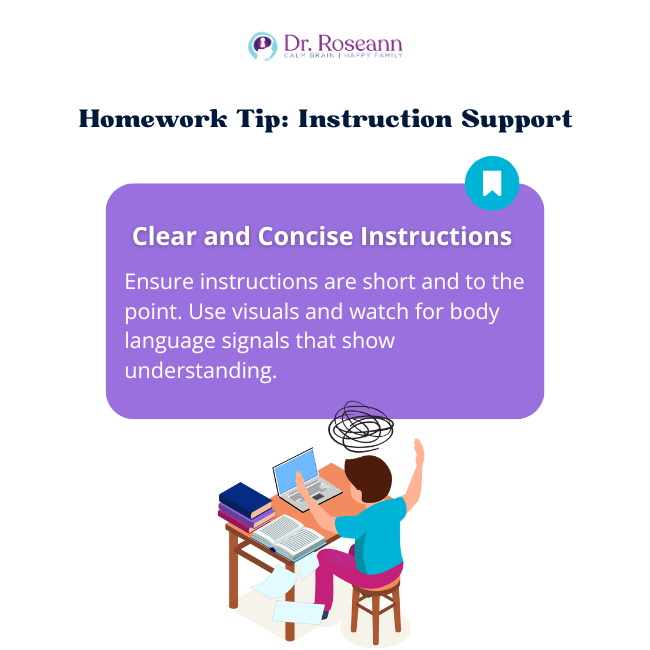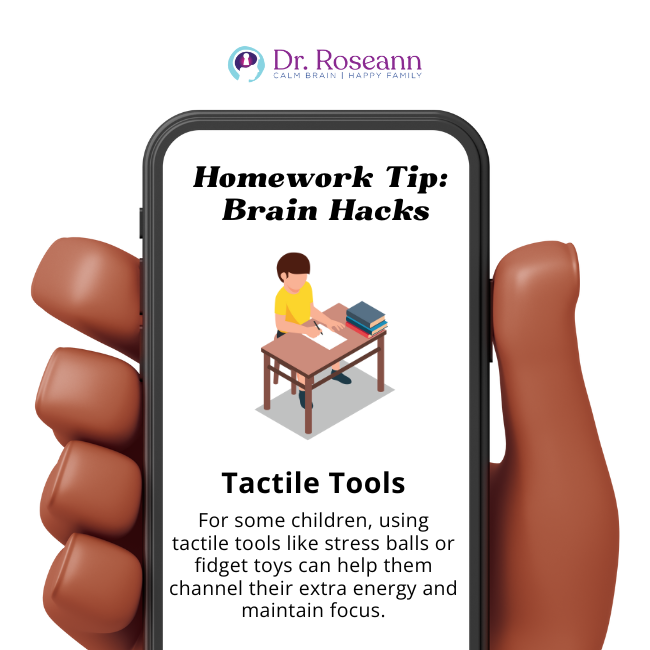Navigating the intricacies of homework assignments can often feel like a maze for both parents and children alike. As someone deeply involved in child development and having worked closely with many educators, I've gathered a wealth of insights into establishing a solid homework routine.
This article is a compilation of those tried-and-tested homework tips, aimed to ease challenges and enhance productivity. Whether you're looking to foster a deeper connection with your child's teacher or seeking effective strategies to prioritize tasks, I'm here to guide you.
Homework Tips for Parents: Break the Stress and Boost Learning Hacks from a Children’s Psychologist
Homework Tip: Setting Up The Environment
- Establish a Routine: Set a specific time and place for homework to create consistency and predictability.
- Routine Consistency: Keep the routine consistent, even on weekends, so the child knows what to expect.
- Provide a Quiet Space: Ensure your child has a quiet, well-lit, and comfortable place to work, free from distractions.
- Limit Distractions: Keep TVs, mobile phones, and other distracting electronics off during homework time.
- Limit Overall Stimuli: A clutter-free workspace can reduce distractions. Try to minimize items on their workspace that they might fidget with or get distracted by.
- Stay Organized: Use planners, calendars, or apps to keep track of assignment due dates.
- Equip the Space: Stock the homework area with essential supplies such as pencils, paper, erasers, and rulers
Homework Tip: Instruction Support
- Clear and Concise Instructions: Ensure instructions are short and to the point. Use visuals and watch for body language signals that show understanding.

- Break Tasks Into Manageable Chunks: If an assignment is extensive, break it down into smaller steps to make it more manageable.
- Chunking Information: Divide information into smaller, more digestible chunks. This can make the work seem more manageable.
- Set Time Limits: Use a timer to allocate specific amounts of time for each task, helping children stay on track.
- Timers: Use a visual timer, so they can see how much time they have left to work. This can make the passage of time more tangible.
- Teach Time Management: Help them prioritize their tasks, tackling more challenging or urgent assignments first.
- Stay Involved: Regularly check in with your child about their assignments and progress, offering guidance when needed.
- Interactive Tools: Consider using interactive educational tools or apps that can make learning more engaging for them.
- Ask Them To Explain What The Task Is: Gage what your child understands before they start the task. This will help set them in the right direction and give you a sense of what they know.
Homework Tip: Brain Hacks
- Physical Activity: Encourage short bursts of physical activity during breaks, like jumping jacks or a quick walk around the block. Physical activity can help increase attention span.
- Encourage Breaks: For longer homework sessions, ensure kids take short breaks to rest their minds and bodies.
- Offer Healthy Snacks: Brain-boosting snacks can help maintain energy and focus during study time. Fizzy drinks such as a seltzer-magnesium drink can stimulate and calm the brain.
- Shorter Work Periods: Divide homework time into shorter, more frequent sessions. For instance, instead of a continuous 30-minute session, try three 10-minute sessions with short breaks in between.
- Visual Schedules: Use visual aids like charts or diagrams to outline the tasks that need completion. This can help them understand what's expected and track their progress.
- Tactile Tools: For some children, using tactile tools like stress balls or fidget toys can help them channel their extra energy and maintain focus.

- Background Music: Some children focus better with low-volume, non-distracting background music or white noise. But others are stressed by it, so play around and do what works best for them (not you!).
- Color Coding: Use colors to categorize and prioritize tasks. This can help visually differentiate and organize their work.
- Mindfulness and Relaxation Techniques: Mindfulness techniques like deep breathing, visualization, or even short meditation sessions can help center their attention.
Homework Tip: Monitoring, Communication and Positive Reinforcement
- Stay Positive: In your own mindset. Focus on the effort and improvements, not just the end result. Praise hard work and resilience.
- Encourage Independence Over Time: While it's essential to offer support, allow kids to complete assignments on their own as they build skills before you check the work. This fosters responsibility and self-reliance.
- Be Available for Questions: Make sure your child knows they can come to you if they have questions or need clarification on a topic.
- Connect Learning to Real Life: Help your child see the real-world applications of what they're learning to make it more engaging.
- Review Completed Assignments: Go over finished homework to ensure understanding and check for errors, but avoid doing the work for them.
- Explain Consequences and Establish Rewards: Positive reinforcement can motivate your child. Consider rewards for consistent homework completion.
- Encourage a Growth Mindset: Teach your child to see challenges as opportunities for growth. Emphasize the value of persistence and learning from mistakes. Talk to kids about how regular practice builds skills even when the learning is hard!
- Positive Reinforcement: Reinforce positive behavior immediately. If they've focused well for a short span, reward that effort to encourage repetition of the desired behavior.
- Active Participation: Encourage them to engage actively with their work, such as reading aloud or teaching the content back to you. This can reinforce their understanding and attention.
- Regular Check-ins: Check in more frequently during their homework sessions, offering guidance, encouraging movement to support brain alertness.
- Immediate Feedback: Give immediate feedback on their work. This keeps them engaged and lets them know they're on the right track.
- Open Communication: Ensure your child feels comfortable discussing their challenges with you. Sometimes, they might have insights into what might help them focus better.
Long Game Parent Homework Tips
- Stay Informed: If your child has a diagnosed attention disorder, like ADHD, stay updated with the latest strategies and recommendations specific to their needs. You can join our CALM Brain Parenting Community for science-backed solutions to support attention and learning.
- Stay in Touch with Teachers: Regular communication with educators can give insights into how your child is doing and where they might need additional help. They may benefit from school accommodations or more formal IEP support.
- Seek External Support: If focus issues persist, consider seeking help from a tutor, educational therapist, or counselor familiar with attention challenges.
Reflecting on these pivotal parent homework tips, it becomes evident that with the right strategies, we can turn potential struggles into stepping stones for success. By instilling a consistent homework routine and maintaining open communication with your child, we're setting the stage for academic achievements.
Each child is a unique individual, and it's crucial to discover what resonates best with them during homework time. It is also important to look for root causes better and better understand why your child is struggling.
With these tools at your disposal, I'm confident in your ability to lead your child through the myriad tasks and challenges that lie ahead. Together, let's make every homework session a journey of growth and discovery and tamp down frustration!
Always remember… “Calm Brain, Happy Family™”
Disclaimer: This article is not intended to give health advice and it is recommended to consult with a physician before beginning any new wellness regime. *The effectiveness of diagnosis and treatment vary by patient and condition. Dr. Roseann Capanna-Hodge, LLC does not guarantee certain results.
Are you looking for SOLUTIONS for your struggling child or teen?
Dr. Roseann and her team are all about science-backed solutions, so you are in the right place!
Grab your complimentary copy of
147 Therapist-Endorsed Self-Regulation Strategies for Children: A Practical Guide for Parents
You can get her books for parents and professionals, including: It’s Gonna Be OK™: Proven Ways to Improve Your Child’s Mental Health, Teletherapy Toolkit™ and Brain Under Attack: A Resource For Parents and Caregivers of Children With PANS, PANDAS, and Autoimmune Encephalopathy.
If you are a business or organization that needs proactive guidance to support employee mental health or an organization looking for a brand representative, check out Dr. Roseann’s professional speaking page to see how we can work together.
Dr. Roseann is a Children’s Mental Health Expert and Therapist who has been featured in/on hundreds of media outlets including, CBS, NBC, FOX News, PIX11 NYC, The New York Times, The Washington Post, Business Insider, USA Today, CNET, Marth Stewart, and PARENTS. FORBES called her, “A thought leader in children’s mental health.”
She is the founder and director of The Global Institute of Children’s Mental Health and Dr. Roseann Capanna-Hodge, LLC. Dr. Roseann is a Board Certified Neurofeedback (BCN) Practitioner, a Board Member of the Northeast Region Biofeedback Society (NRBS), Certified Integrative Mental Health Professional (CIMHP) and an Amen Clinic Certified Brain Health Coach. She is also a member of The International Lyme Disease and Associated Disease Society (ILADS), The American Psychological Association (APA), Anxiety and Depression Association of America (ADAA) National Association of School Psychologists (NASP), International OCD Foundation (IOCDF) International Society for Neurofeedback and Research (ISNR) and The Association of Applied Psychophysiology and Biofeedback (AAPB).
© Roseann-Capanna-Hodge, LLC 2023










